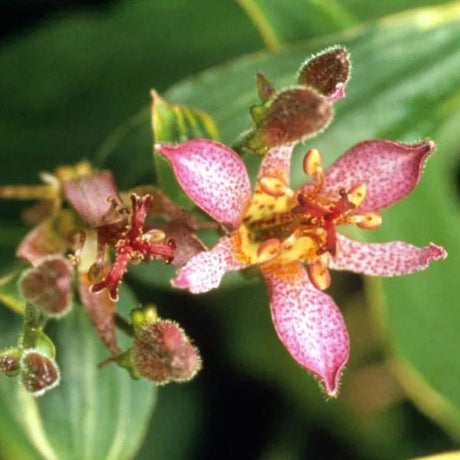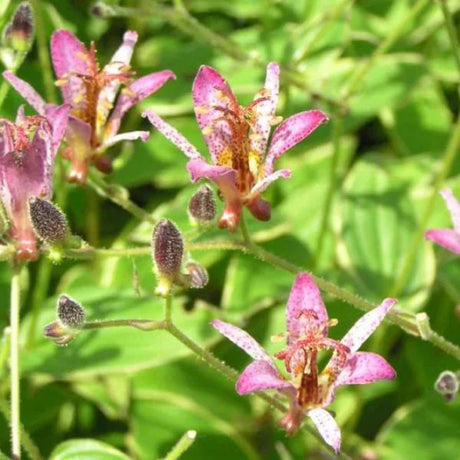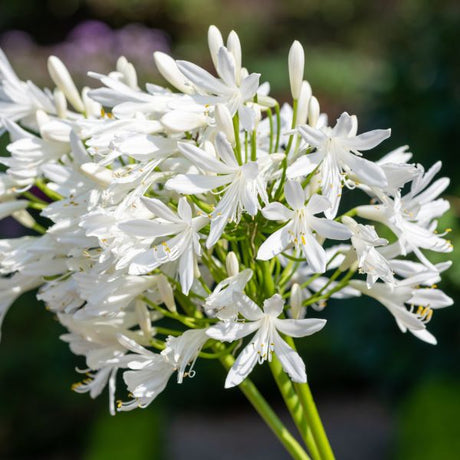Agapanthus praecox ssp. orientalis 'Getty White'
Regular price $3458Unit price /Unavailable

Gorgeous star-shaped summer bloomers, Lilies are delightful ornamentals that bring color, fragrance, and height to your landscape both indoors and out!
Steeped in symbolism and history, Lilies (Lilium) have appeared in paintings dating as far back as 1580 B.C. and are among the oldest cultivated ornamentals with a few varieties grown for food. Lilies are the May birth flower and have many meanings associated with them in the Victorian language of flowers.
Incredibly easy-to-grow bulbs, cold-hardy, and heat-tolerant, these sun-loving perennials put others to shame during their bloom! Find out more about these great plants and some of our favorites below!
There are over 635 species of true Lilies in the Lilium genus which include:
- Oriental Lily
- Asiatic Lily
- Easter Lily
- Tiger Lily
Plus there are many Hybrid varieties on the market resulting in a vast array of colors, sizes, and forms available for you to choose from!
Lilies grow from slowly multiplying scaled bulbs with upright stems lined in short strappy green leaves.
How do you choose the right Lily for your garden?
Browse only for the Lilies that are right for your Planting Zone using our USDA zone filters, choose sun exposure levels, or narrow the options by flower color, height, and more!

How do you grow and care for Lilies?
Get your new Lilies off on the right foot with these simple tips and with Nature Hills Root Booster!
- Choose a full sun location or partial shade area in hot climates
- These Lilies do best in well-drained soil so the bulbs do not rot
- Create raised gardens or berms if you have poor drainage.
- Provide a 3-4 inch deep layer of mulch over the root system
- Water new plants regularly using the Finger Test to help them get established

Can You Leave Lily Bulbs in the Ground All Year?
As long as you choose bulbs for your growing zone, you can leave the bulbs in the ground or their pots year-round. If you choose bulbs that grow outside of your growing zone, you can treat Lilies as you would Canna and Dahlia, lifting the bulbs before a hard frost occurs. Or you can use these fast-growing bulbs as annual accents.
How Do You Use Lilies In The Landscape?
Lilies are fantastic in cut flower gardens and pollinator borders, even attracting hummingbirds to your garden.
Plant taller Lily varieties as backdrops or focal point pops of color and shorter plants in groupings and rows throughout the sun garden. Plant in mixed perennial borders, English Cottage gardens, and formal garden beds. Mixing with wildflowers, Roses, sun perennials, and flowering shrubs equally.
Lilies of all sizes are great in container gardens as thrillers!
Do Lilies Come Back Every Year?
Lilies are herbaceous perennials that grow from scaled bulbs and come back each year bigger and better, forming gradually expanding clumps of bulbs that each have their own flowering stems.
Are All Lilies Related?
While some plants named ‘Lily’ are True Lilies, others are not. While Calla Lilies, Water Lilies, Canna Lilies, Lily of the Valley, and Peruvian Lilies are not True Lilies while plants like Onions, Tulips, Fritillaries, Tulips, and Trillium are all in the Lily family.
Why Order Lily Plants From NatureHills.com?
Family-owned and operated since 2001, Nature Hills Nursery prides itself on meeting the needs of customers with an ever-growing collection of online plants backed by our product guarantee and protected by Plant Sentry™.
All of our Lily bulbs are delivered safely to your home with instructions for planting, care and maintenance, so you can order knowing you'll have exactly what you need! Plus plenty more information in our #ProPlantTips Garden Blog for extra support and inspiration!
FAQ's for Buying Lilies Online
What are the different types of Lilies available at Nature Hills Nursery?
What are the different types of Lilies available at Nature Hills Nursery?
At Nature Hills Nursery, you’ll find an incredible variety of true Lilies (Lilium), including favorites like Oriental Lilies, Asiatic Lilies, Easter Lilies, and Tiger Lilies. Each brings its own personality to the garden, with unique bloom times, fragrances, and vibrant colors. Hybrid varieties also offer everything from compact sizes for containers to towering stalks for bold backdrops—there’s a Lily for every garden vision!
When and where should I plant Lily bulbs for best results?
When and where should I plant Lily bulbs for best results?
Plant your Lily bulbs in spring or fall, depending on your zone, in well-drained soil with full sun to partial shade. Avoid soggy spots—Lilies hate wet feet! In warmer climates, a bit of afternoon shade helps keep blooms fresh. For cooler zones, full sun brings out the best performance. Add mulch to retain moisture and protect roots, and you’ll enjoy tall, fragrant blooms throughout the summer.
Do Lilies bloom every year?
Do Lilies bloom every year?
Yes, Lilies are hardy herbaceous perennials that return year after year! These beauties grow from scaled bulbs that slowly multiply underground, forming larger clumps over time. Each year brings more stems and more blooms, so your Lily display just gets better with age. With minimal maintenance, they’ll grace your landscape season after season with color, fragrance, and elegance.
Can I grow Lilies in containers or small spaces?
Can I grow Lilies in containers or small spaces?
Absolutely! Lilies thrive in container gardens, especially compact varieties like Asiatic Lilies or dwarf hybrids. Just choose a deep, well-draining pot, fill it with nutrient-rich soil, and place it in a sunny spot. Lilies make stunning vertical accents or “thrillers” in potted arrangements and are perfect for patios, decks, and balconies that need a splash of summer drama.
Are all plants with “Lily” in their name actually Lilies?
Are all plants with “Lily” in their name actually Lilies?
Not quite! Only plants in the Lilium genus are considered true Lilies. While popular picks like Calla Lily, Canna Lily, Lily of the Valley, and Water Lily may share the name, they belong to completely different plant families. True Lilies grow from scaled bulbs and boast tall, upright stems and star-shaped blooms, while the others have different growth habits, flowers, and care needs.




